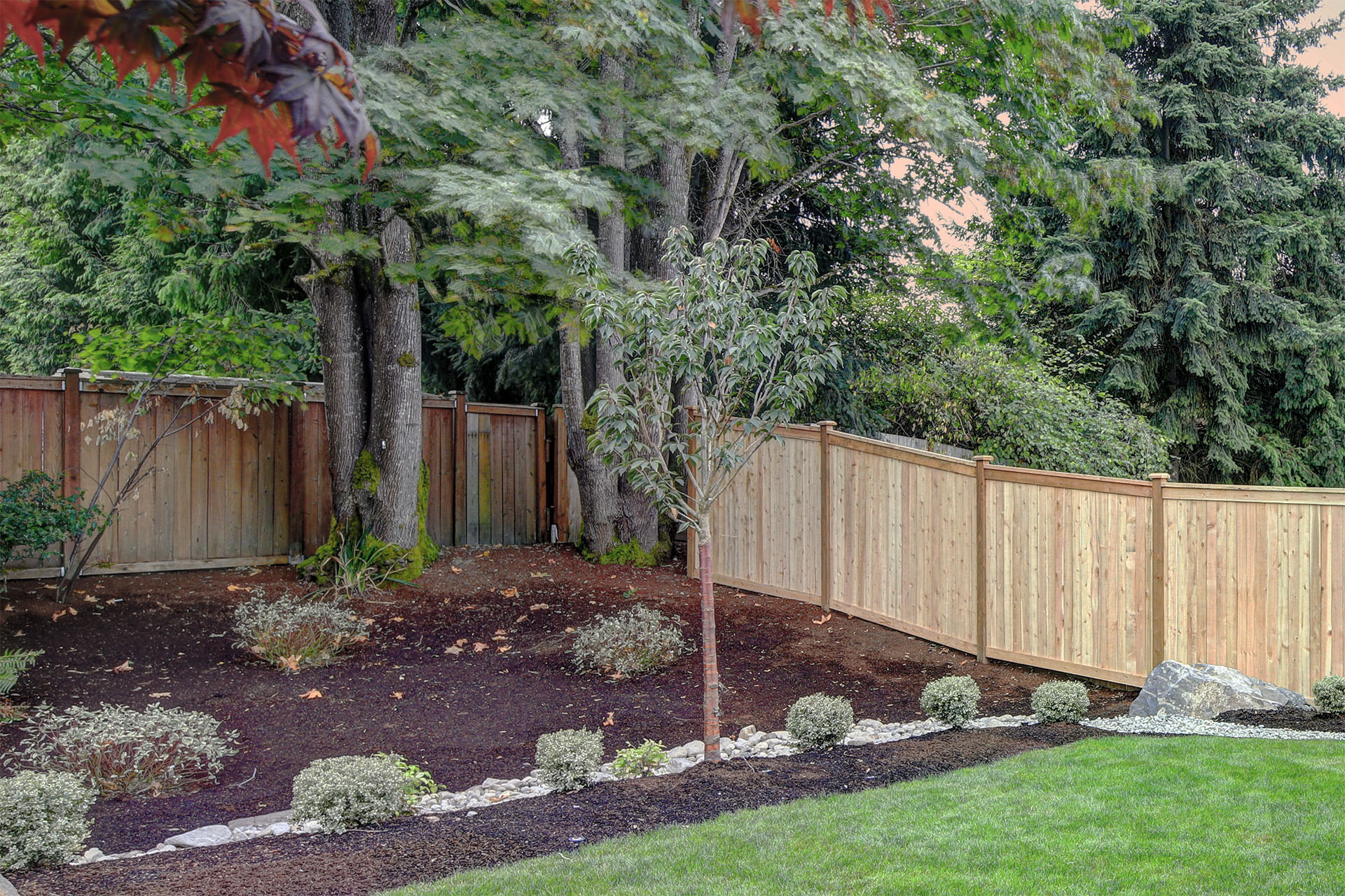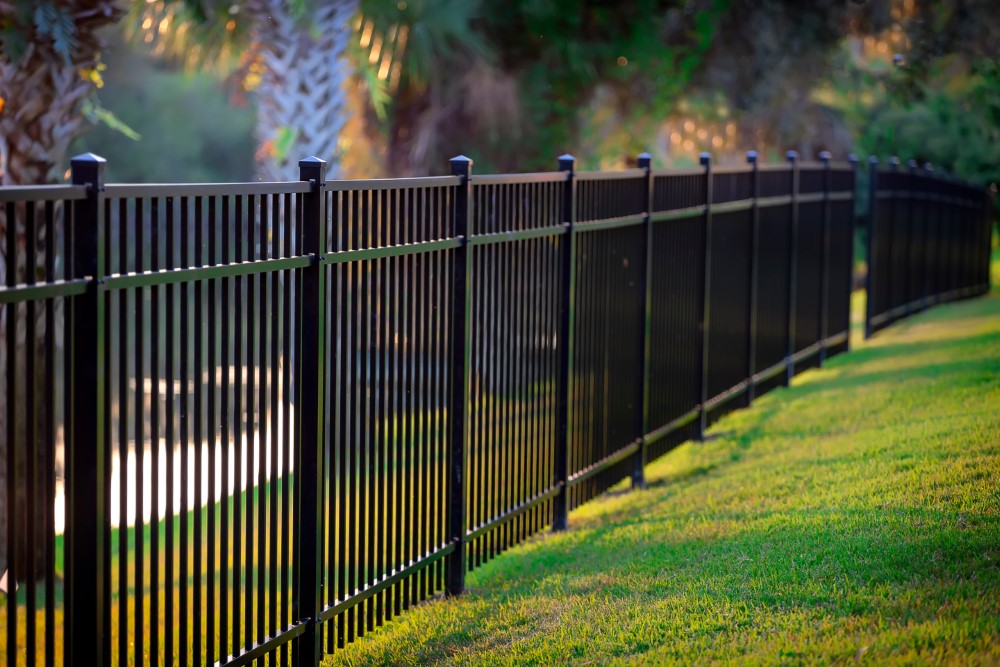
Building a Fence on Uneven Ground
Very few yards are completely flat, and different parts of the country have more and less even ground. But here in Georgia, flat expanses are the exception, and the Atlanta Metro Area is known for its hilly topography. Building a fence on uneven ground poses a challenge, but it’s not impossible. Bravo Fence can build beautiful fences on slopes and undulating ground, even if it takes a little more work. We have over 15 years of experience building fences all around Georgia on flat ground, undulating landscapes, and steep slopes.
The Challenges of Building a Fence on Uneven Ground
When the ground is just a little bit bumpy, it’s only a minor task to even things out enough to build a level fence. But with truly uneven ground—ground that dips or slopes—regular fencing becomes problematic. On flat ground, a fence consists of three parts. Vertical posts, driven deep into the ground, support the rails. Horizontal rails run between the posts, and in most styles of fence, they hold pickets. Vertical pickets or boards are attached to the rails to give the fence its appearance, either with openings or sealed off for a privacy fence.
Risks of Uneven Fencing
When the ground is sloped, there is a problem with this basic structure. The posts end up at different elevations, and they cannot be connected with level rails and pickets. Building a fence on uneven ground can also lead to other issues.
First, the fence itself is likely to be weaker if it’s not built on level ground. Second, an uneven fence is more likely to fall over, which could cause serious injury to anyone who happens to be nearby.
Third, fence posts that are not level can cause the fence panels to sag or warp, making the fence less attractive and potentially affecting its function. Finally, an uneven fence can be difficult to properly maintain, as weeds and other plants can quickly take root in the cracks and crevices created by the uneven surface.
Solutions for Building a Fence on Uneven Ground
There are three ways of fixing this problem, each with its own challenges.The best solution for your fence will depend on the severity of the unevenness and the desired look of the fence. Some solutions include:
Level-Topped Fence
If your ground doesn’t slope but instead undulates with dips and rises, you may be able to install a level-topped fence. This is just a fancy name for the same sort of fence you would install on flat ground, with a top that is level all the way across. If your land doesn’t slope but suffers from uneven areas where it dips, you can build a level-topped fence with a little landscaping. Start by filling in the low spots with a bit of soil and grass seed. For larger dips, you may need to fill in with rocks and gravel with dirt on top. Another alternative is to plant bushes and plants along the base of the fence to hide irregularities.
Stepped Fencing
If you have a steep slope to contend with, stepped fencing may be your best option. With stepped fencing, each panel (the space between posts) is a step up from the one before. While it doesn’t provide the smooth, even lines of a regular fence, it can accommodate steep slopes without installing an excessively slanted fence line.
The significant drawback of stepped fencing is that it leaves a triangular open space between each panel and the sloping ground below. If you have pets or small children—a common reason for installing a fence—that may be unacceptable. So if you need a fully-enclosed fence, you can combine stepped fencing with additional landscaping and fill in the spaces with new soil and grass seed. If the spaces are small enough, they can also be blocked with planters or thick bushes.
Racking Fences
Stacking fences are a relatively new technology that first appeared around two decades ago and has grown in popularity since then. Stacking fences are prefabricated fencing panels in which the pickets are attached to the rails with hinges. The posts are placed at different levels, as dictated by the sloping ground, and the rails between them follow the angle of the slope. The hinged pickets remain upright and follow the slope of the rails. For slight to moderate grades, racking fences provide a quick solution and a custom look without all the meticulous calculations and labor-intensive installation of a genuinely custom fence.
The primary disadvantage of racking fences is that as the grade of the slope increases, the pickets will be closer together. This can give an uneven appearance, and most manufacturers recommend a slope of 10º or less. Some specialty racking fences are available for steeper grades, but in general, steep grades require custom fencing for a smooth, level top.
Custom Fencing
When your yard includes steep slopes, undulating terrain, and other challenging building surfaces, custom fencing is the best, and sometimes the only, solution. Bravo Fence Company has been building fences for over 15 years, and many of our technicians have been building fences even longer than that. We have the experience and skills to achieve a beautiful, smooth-looking fence on even the most challenging terrain.
Custom fencing is cut and built on-site to match your yard’s specific needs, whether it includes hills, dips, or valleys. We provide wood, aluminum, steel, chain link, and vinyl fencing in a wide variety of styles.
Takeaways
When building a fence, one of the biggest challenges you can face is constructing it on uneven ground. Uneven ground creates all sorts of problems for fence builders, from weakening the fence’s structure to causing it to fall over altogether.
No matter what type of fence you choose to build, be sure to take the time to properly prepare the ground before you begin construction. This will help ensure that your fence is stable and looks great for years to come.
Whether you want a sleek wooden privacy fence, an ornate steel fence, or traditional white pickets, we have you covered, whatever your yard looks like. Contact us today for your free quote.
